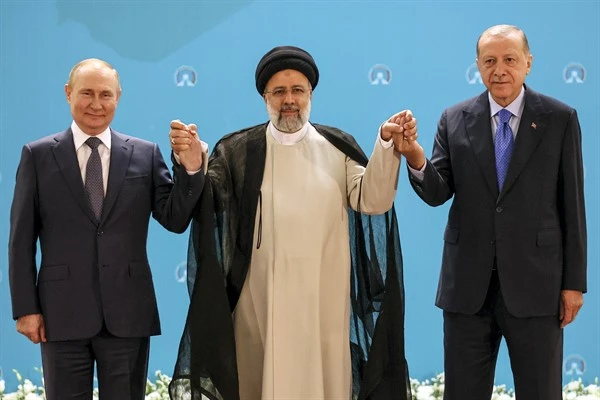Address
304 North Cardinal St.
Dorchester Center, MA 02124
Work Hours
Monday to Friday: 7AM - 7PM
Weekend: 10AM - 5PM
Address
304 North Cardinal St.
Dorchester Center, MA 02124
Work Hours
Monday to Friday: 7AM - 7PM
Weekend: 10AM - 5PM


Lately, Turkey has been the centre of world’s diplomacy traffic. Earlier this summer, Sweden and Finland’s NATO bids were stopped by Turkey until an agreement was reached in late June. At the same time, Turkey also cooperated with Israel in preventing potential Iranian attacks on Israeli citizens within the Turkish territory. Turkey has also been trying to solve its air force modernization problem which became more acute after it was excluded from the F-35 project. In return for supporting Sweden and Finland’s NATO bid, Turkey received the support of US President Biden, not for returning to the F-35 project, but for purchasing new F-16s and modernizing kits for its existing F-16 fleet. Moreover, under Turkey’s brokership Russia and Ukraine reached a wheat export deal which is expected to ease global food crises. The deal was signed on 22 July, just after Erdogan had met with Russian president Vladimir Putin in Iran where he attended a trilateral summit on the conflict in Syria. However, Turkey signs energy agreements with Russia and does not sanction it while being one of the main supporters of Ukraine by providing TB2 Bayraktar drones which are extremely effective against the Russian troops. Erdoğan’s meeting with Putin both in Tehran and Sochi during the last two weeks raised questions about Turkey’s liability and commitments to NATO. Therefore, is Erdoğan’s ‘balance between the West and Russia’ policy isolating Turkey or leaves her a room for becoming a ‘game maker’ in the region including the Mediterranean and the Caucasus?
Summer 2022 has already been diplomatically intense for Turkey, and it succeeded in receiving attention from the world. Especially in the last decade, Erdogan has been locating Turkey in a position where it is not reliant on either Europe or the US while investing in the domestic arms industry and from time to time collaborating with Russia, who is regarded as the greatest threat to NATO. Turkey purchased Russian made S-400 defence missiles in 2017, a move that was criticised by the NATO members, especially the USA, who excluded Turkey from the F-35 project despite Turkey’s technical and financial contributions.
Turkey’s hand in Syria for a military operation against the Syrian Democratic Forces (SDF) and People’s Defense Units (YPG) became stronger after the US left Syria, and Russia has launched the war in Ukraine. Meanwhile, Turkey has silenced pro-SDF and YPG NATO members by lifting its veto on Sweden and Finland’s NATO bids. Instead of its NATO allies, Turkey is negotiating Syria’s fate with Iran and Russia, both of whom are considered to be a threat in Europe and Washington, but also influential in Syria. Therefore, by pushing its western allies aside, Turkey is promoting itself as a ‘game maker’ in the region at the cost of alienating its NATO allies.
However, the meeting held in Tehran on 19 July, does not necessarily mean that Turkey is allying itself with Iran and Russia. On the contrary, Turkey has been a rival of Putin’s expansionist policies in Libya, Syria, and Ukraine. The two countries are generally on the opposite sides of conflicts without being involved in a direct engagement. Therefore, to what extent would it be accurate to call Turkey and Russia as allies?
About Iran and Turkey, the same could be argued. Last week on 20 July 2022, a bloody attack in the northern Iraqi city of Duhok killed nine people and left twenty-three wounded. Baghdad has held Turkey responsible, since Turkish armed forces have been bombing Kurdistan Worker’s Party’s (PKK) camps in the region. The Iraqi government has repeatedly demanded Turkey to stop its military operations on Iraqi soil, unlike Saddam Hussein, the dictator of Iraq pre-2003, who allowed Turkey to launch military operations against the PKK in northern Iraq. Turkey rejected Baghdad’s accusations and offered to set up a collaborative investigation to find the culprits of the attack. According to Iraqi journalist Salam Adil, Iraqi military experts investigating the attack site reported that four 120 mm-6 km howitzer shell remains were found, used mainly by the Peshmerga and other weaponized groups in Iraq, while the Turkish Armed Forces (TSK) use 155mm shells.
Iraq and Syria are two sites of conflict where Iran and Turkey find themselves on opposing sides because they both claim that their security concerns are to be addressed in these countries. Iran supports Shiite groups who constitute over 60% of Iraq’s population while Turkey bombs PKK camps in the north of the country. The same policies apply for Syria as well. Therefore, neither would Turkey benefit from a more influential Iran in those countries nor would Iran like to see Turkey expanding its influence in the region.
For example, reports also demonstrate that Turkey is targeting pro-Iran militias in Iraq. Iran-backed groups make their anti-Turkey positions clear as well. In the end, although the Turkish government has repeatedly announced its plans for a military operation in northern Syria, Turkey cannot find any allies to support its plans. Iran, US, EU and Israel all note their opposition to Turkey’s military operations, which are considered to be vital by Ankara.
Erdogan’s policies to make Turkey self-reliant and independent from the US and Europe, whose interests usually contradict Turkey’s, push Turkey to collaborate with Russia and Iran, whose interests also contradict with Turkey’s. Therefore, by seeking full self-reliance and still pursuing regional ambitions by itself, Turkey is isolating herself rather than establishing long term committed alliances. Under these conditions, NATO, in which Turkey is a significant and equal member, seems like the most reliable alliance Turkey has in hand despite all its disputes with the other member countries.